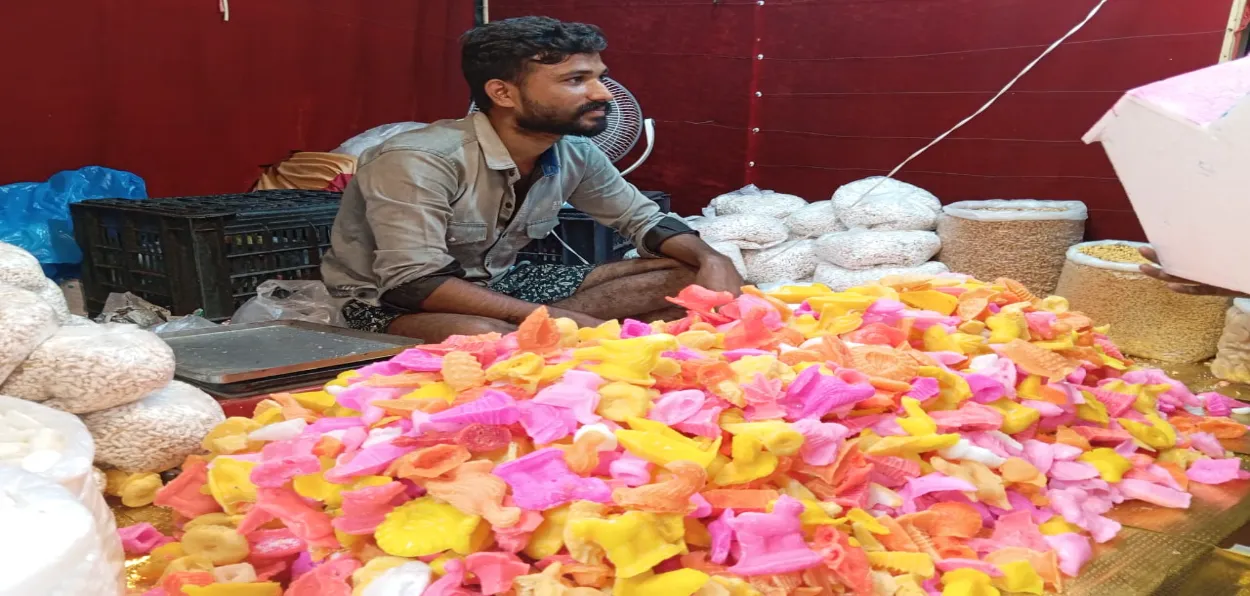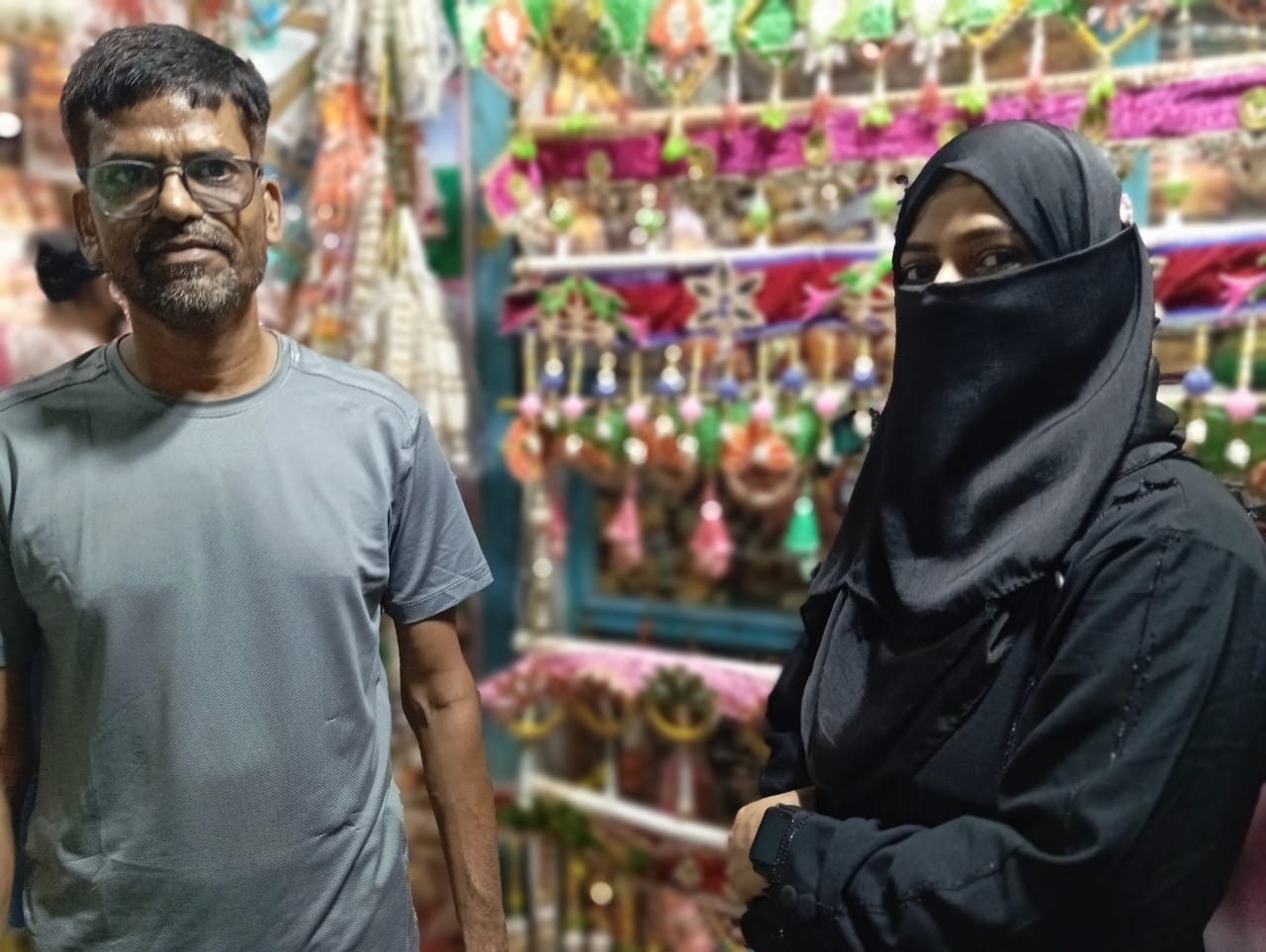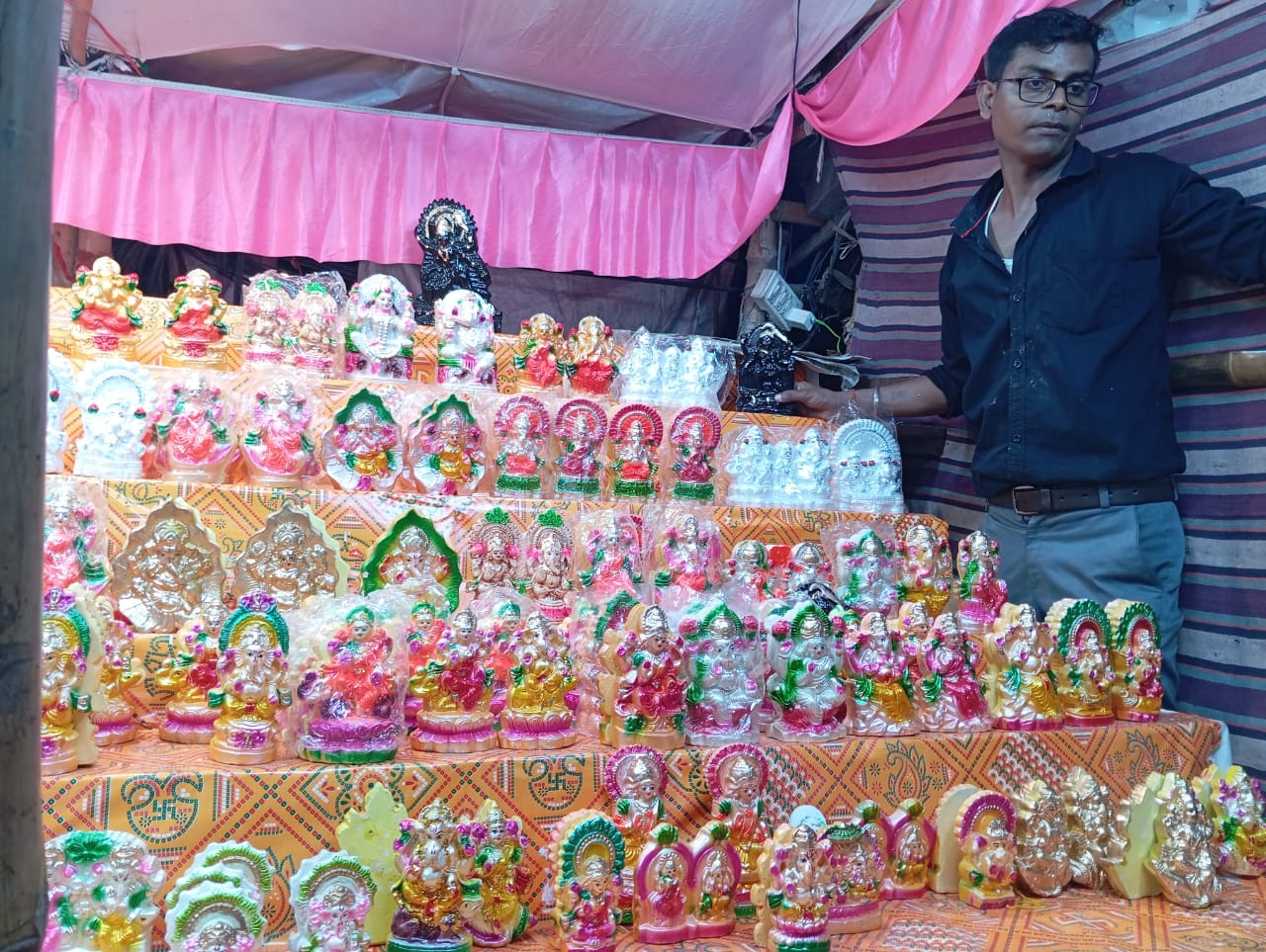
A trip to several local markets at Asansol on Dhanteras and Diwali reveals how the cultural assimilation of Hindus, Muslims, Christians, and Sikhs here is nothing to brag about. It is ingrained in the Asansoli’s souls. The population has people from Bengal, Bihar, Punjab, and parts of the U.P making it a home forever.
Rana Siddiqui Zaman/Asansol (West Bengal)
All roads at Asansol, West Bengal in East India, are filled with toys- pink, green, red, yellow, and more. These are kitchen toys; traditional chulha (mud stove), kadhai (deep pan), gamla (deep spread utensil to kneed flour), sil-batta (stone grinder/ smoother), imam-dasta (stone/aluminium spice grinder), bucket, pitcher, spoon and much more. The important utensil a candle/diya stand with god’s image overlooking it. It is lit at night.
The daughters and daughters-in-law, irrespective of age make a mud house on their own and place these utensils inside it, filling it with mishit-doi (sweet curd), rice, and two types of vegetables/ in a four-bowled toy. That denotes and invites prosperity in the house. However, the market has also started selling thermocol houses or gharonda these days.
Seerat Jahan a graduate, has married to Rahul Rajat, a local boy who works with Flipkart. Their daughter Myra has decorated the mud house that Seerat has built. She has been doing it for five years now. While she wears a bindi and sindoor and performs all puja customs, she offers her namaz regularly too.
Rajat and Seerat are parents to a four-year-old daughter and they proudly say tey have never faced a conflict on the basis oif religion.
 A Muslim woman shopping for Diwali
A Muslim woman shopping for Diwali
She makes a mud house, much to her kid’s delight, and with her arranges utensils inside the gharonda. While her husband performs pooja, she sits along and also offers her namaz “always on time,” Her mother says, “I don’t want their pictures to be published. Let us be safe from any eventuality,” she requests.
Almost every household whether it is a Muslim or Hindu buys these kitchen toys made by local artisans and from Santiniketan - the abode of Guru Rabindranath Tagore nearby.
The kitchen toys and colourful images of Lakshmi -Ganesh, (Hindu Gods for wealth and prosperity) apart from other accessories for them are bought only these three days- from Dhanteras to Diwali evening. The dhanteras as the word denotes means ‘dhan’ or wealth, symbolically means shower of wealth and prosperity.
No wonder, the cultural assimilation can be witnessed in the fact that even local Muslims end up buying something new on this day, it could be as mammoth as a bus to ferry people in and out of this ‘City of Brotherhood’ to as small as a house broom, to wipe off old dust and dirt of homes, for the entire year and start life afresh.
A comparatively well-off household of a Muslim family in the Hill View area, buys, “a silver coin on dhanteras as a mark of wealth and prosperity from the day on.”
Each Dhanteras when I go to buy a coin for myself, I also buy it for my Muslim neighbour,” says SangeetaVerma, mother of two daughters at a posh Hill View Area of Asansol.
Kitchen Toys made on Diwali
Sweet toys
No wonder, the Asannol Market is as busy as a railway station these three days. People can be seen almost huddled on each other to buy images of the gods and colorful khoy-mithai (kheel-khilano or sweetened toys and dried puffed rice).
Rahul, a khoy-mithai seller is selling the combo for just Rs. 40-50. This is a time, he says, children from Muslim families are attracted to his shop “for colourful sugar toys”. If traditional Hindu families buy more sweets, Muslim families go for these sugar toys. He witnesses “many burqa/hijab-clad women with children” picking his colourful horses, aliens, ducks, elephants, and so on.
However, his aide nearly shouts at me, “Why are you filming us? Why don’t you film the pick-pockets who steal mobiles and money from buyers’ pockets? Just now a woman has been caught with four mobiles when chased. Police prashasan yahan kuch nah karta hai (police personnel never helps us here,”, he complains furiously.
He is quite right. In the poshest of the areas, the pickpockets steal in broad-day light, never to be caught. Their innovative ideas of stealing wallets, purses, and mobiles can put the most creative thriller novelists to shame.
Women, therefore, are seen clasping their handbags to their bosoms and men to their mobiles.
 The statues of demigods on sale in Asansol market
The statues of demigods on sale in Asansol market
Durga and Muslims
The market that has multiple alleys shows up mammoth mud image of Goddess Durga created by the local Muslims at Bastin Bazar and Kolkata. One can see a huge image of the Goddess of power ferried on a rickshaw. Notably, these images are made, coloured and decorated by Muslims. Her ‘chunri’ or drape is tailored by Muslim tailors locally.
“We never felt that we were making one for their Goddess. It is our duty to do our job without communalising it. Eid suits are being tailored by so many non-Muslim female tailors like me”, says the female owner of Cinderella, Asansol’s most famous tailoring shop for over five decades.
Nilo Farha, a burqa-clad cosmetic seller at T P Market, known for women-related items, agrees to pose for me with Mohsin, her aide while appreciating jewellery worn by the bright images of the gods and goddesses. So, how does she feel about these images?”
I am an educated woman. That’s’ why I feel the cultural harmony is what keeps Asansol going.” Nilo is right; if a Muslim lady is not wearing a burqa, one won’t be able to make out her religion as Bengali Muslims and Christians here wear bindi and sindoor too.
On the way back home, we, our neighbour Sangeeta Verma, her daughter Raj Nandini and yours truly, take an auto. He is quite a chirpy-naughty young man namely Saddam. He won’t keep quiet. “So you bought something on dhanteras,” He asks us. “Yes, Raj Nandini says fondly clasping her precious buy, “My cute little Lakhsmi-Ganesh, my chachi (me) has bought khoy-mithai… “the teenager is excited.“On Dhanteras, Saddam interrupts her, boasting his Muslim friends bought an auto to invite auspiciousness. “My family people also buy something new these days even if it is a tea set,” he says pointing out to a roadside crockery seller.
Saddam poses for me as he drops us home. The naughty boy asks,“Will you create my poster and make me famous as “a wanted person”? “No. I answered, “I will make you famous for being a good human being who knows and follows the shared culture of Asansol.”
He smiles, scratching his head in confusion. I know that the very idea of a shared existence in Asansol is nothing to brag about. It is ingrained in the souls here.
The author is a senior Journalist
